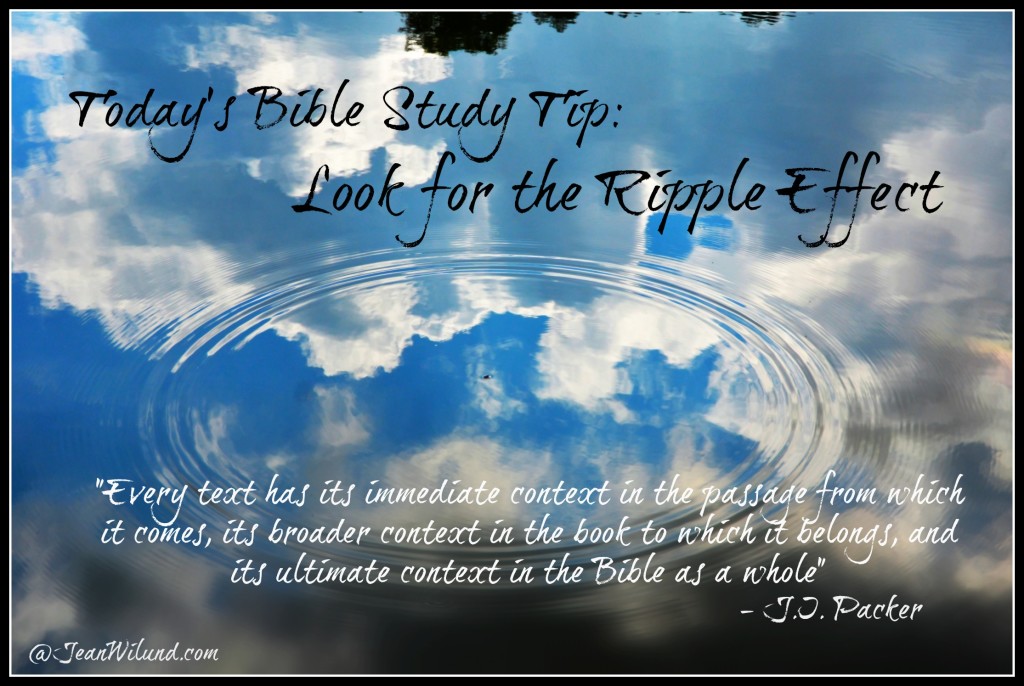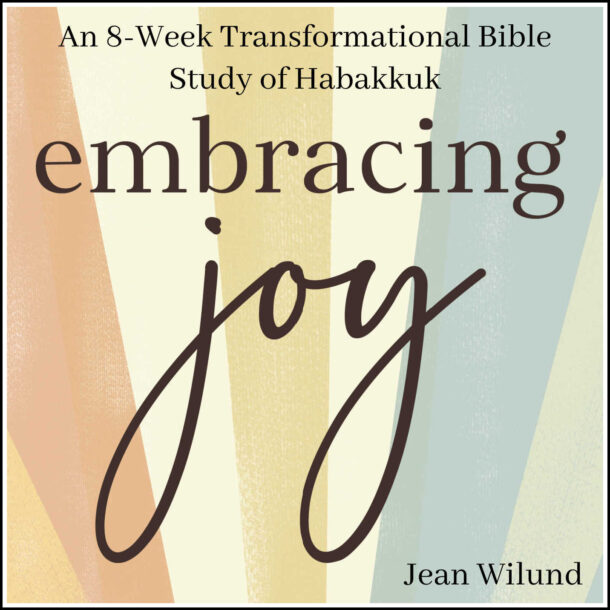When you’re studying the Bible, look for what I call The Ripple Effect.
In previous posts, I’ve talked about the fact that the Bible is not written for the purpose of giving us a lovely little collection of historical events or stories about God. [*]
Instead, the Bible was written, and given to us, so that we could know God and understand the one big story: God redeeming man back to Himself.
The Bible’s message is cohesive and ripples throughout the Scriptures from Genesis to Revelation.
J. I. Packer states this quite nicely, so I’m just going to borrow his words:
“Every text has its immediate context in the passage from which it comes, its broader context in the book to which it belongs, and its ultimate context in the Bible as a whole; and it needs to be rightly related to each of these contexts if its character, scope and significance is to be adequately understood.” ~ J.I. Packer (“The Interpretation of Scripture” )
Let me demonstrate by following one ripple out.
For example, in Genesis 7:1, we read:
“Finally the day came when the Lord said to Noah,
‘Go into the boat with all your family,
for among all the people of the earth,
I consider you alone to be righteous.'”
The First Ripple: Immediate Context
When you’re studying a passage of the Bible, first look at the verses in its immediate context.
In its immediate context of the passages before and after it, we understand from Genesis 7:1 that God spoke to Noah such that Noah could understand Him and obey Him.
God told Noah He was bringing judgment for sin upon the earth by way of a flood since every intention of every heart — except Noah’s — was evil.
God didn’t say that Noah was literally holy, but that He considered only Noah holy. That leads us to understand that Noah’s intentions were to obey and serve God from a heart of love — otherwise, he’d be just as unholy as the rest.
Since nowhere do we see God proclaim Noah’s family to be holy, we see and understand God’s grace. He extended salvation to the members of Noah’s family, not based on their holiness, but through their faith in and obedience to God’s Word and His one way of salvation. Thus, they wisely entered the ark.
The Second Ripple: Broader Context
The next step is to look at the passage in the context of the book in which it is found.
Genesis 7:1 is found in the book of Genesis. (Surprise!)
A study of the book of Genesis reveals that it is, as its name suggests, the book of beginnings. It’s a record of the beginning of the history of the world, sin having come into the world and spreading its effect throughout mankind, and God setting His plan of redemption into motion. Genesis also shows us what redemption looks like.
This passage fits perfectly into the theme of the book of Genesis.
The Third Ripple: Broadest Context
The final step is to look at the passage in the context of the entire Bible.
The story of Noah and the ark is not only a literal record of God’s redemption. It was also a foreshadow of God sending His Son, Jesus Christ, into the world to redeem all who believe from the judgment to come for sin.
This passage clearly fits into the big central story of the Bible: God redeeming man.
In view of all three ripples:
We see the holy character of God, as well as His undeserved grace (Romans 5:8).
We see the scope of His plan to judge the entire world for their sin, but to offer grace and redemption to those who trust and believe in His offered plan of salvation regardless of their sin (John 3:16).
We also see the significance of Noah’s story to us today. Noah and his family had to enter through the one way to be saved — the ark — or face judgment. We, too, must enter through the one way — Jesus Christ — or face judgment (John 12:46-48).
I realize the passage I chose above could be considered obvious.
So what about Bible passages that appear less obvious? How do we see the ripple effect in those?
I’ve been studying I Thessalonians lately, so let’s consider this verse:
I Thessalonians 5:18 — In everything give thanks; for this is God’s will for you in Christ Jesus.
In the first ripple, the immediate context, we see that Paul is writing to the Thessalonians to encourage them to stand strong in their faith, living a life worthy of the gospel, even in the midst of persecution and trials.
God knew everything they were going through, and at the right time and in His way, He would act on their behalf. In every moment, they must rest in His sovereignty and depend on the power of Jesus Christ, knowing their current situation is God’s will for them at that time.
In the second ripple, the broader context of the book of I Thessalonians, we see that Paul was concerned about the church in Thessalonica because of the persecution they’d endured and his not being able to be with them.
He didn’t want them to quickly forsake the teaching they’d received nor turn away from following and obeying the Lord. Neither did he want them to buy the lies of the false teachers, or be uninformed of Christ’s future return.
He wanted them grounded in the truth, living grateful and obedient lives, fully trusting in Christ.
In the third ripple, the broadest context of the entire Bible, we see that there is a spiritual battle going on that’s existed since the beginning of the world in Genesis and will continue on until the end in Revelation. It’s not a battle between God and Satan, though, because God won the war before it even started. Satan has never won a battle againt against God and never will. But man is fighting a spiritual battle. Our sin nature and Satan’s evil forces battle against us daily.
Sin has caused evil to be rampant in the world, and thus all Christians can expect to be persecuted by those who oppose Jesus Christ and His message, and go through trials. The degree of persecution and trials will vary, but the spiritual battle is real and affects the entire world.
Despite persecution and trials of any type, all Christians can and must stand strong in their faith full of grace and love, knowing we can trust God and His will always, no matter what it looks like at the time.
What if you’re new to the Bible and don’t know enough about the different “ripples” to be able to rightly relate them?
Don’t worry. With faithful study, it will come.
My Bible Study Tips and the resources I point you to are designed to help you in your study so that you’ll eventually know how each passage fits together with the rest of the Bible — but more importantly, so you’ll come to know the Author of the Bible. (I’m still learning, too. SO REMEMBER, no matter what I say, make sure you take what I say back to the Bible and make sure it agrees with what God has said. And again, it will come. Just keep studying.)
Let me point you back again to my last tip, Today’s Bible Study Tip #7: Understanding the Big Story of the Bible, which will do wonders for helping you, particularly with the third ripple in the ripple effect.
I promise you that as you begin to see the relationship with each part of the Bible with the rest of the Bible, you’ll only enjoy studying the Bible more and more — and you’ll fall more in love with the God of the Bible and His Son Jesus Christ.
_______________________________
[*] See Today’s Bible Study Tip #1: Read the Bible Like a Novel and Today’s Bible Study Tip #7: Understanding the Big Story of the Bible
__________________________
What Bible Study Tips have helped you? I’d love to share with everyone what tips or resources have helped you in your study of the Bible, so please share your comment below.
Click to Tweet: Bible Study Tip — Look for the Ripple Effect When Studying the Bible







